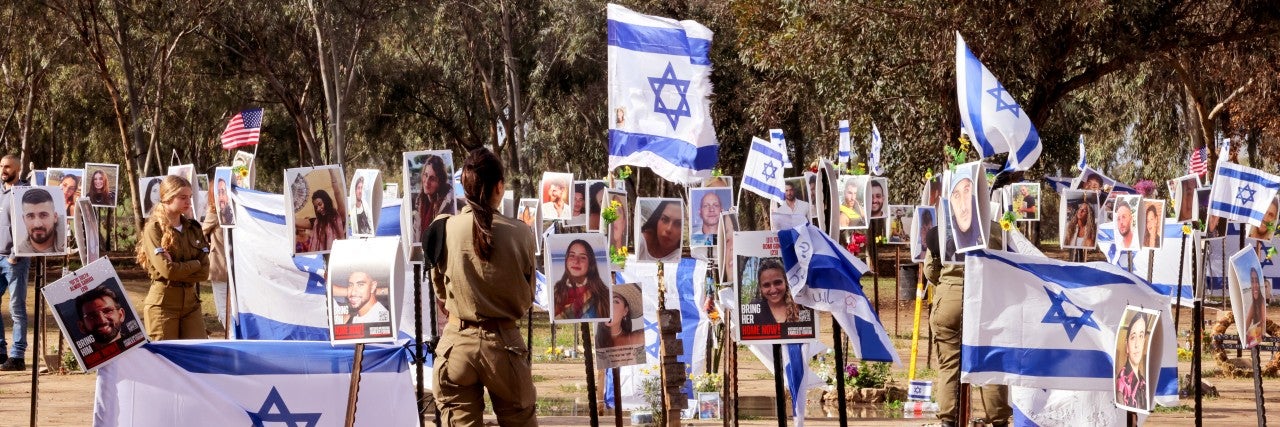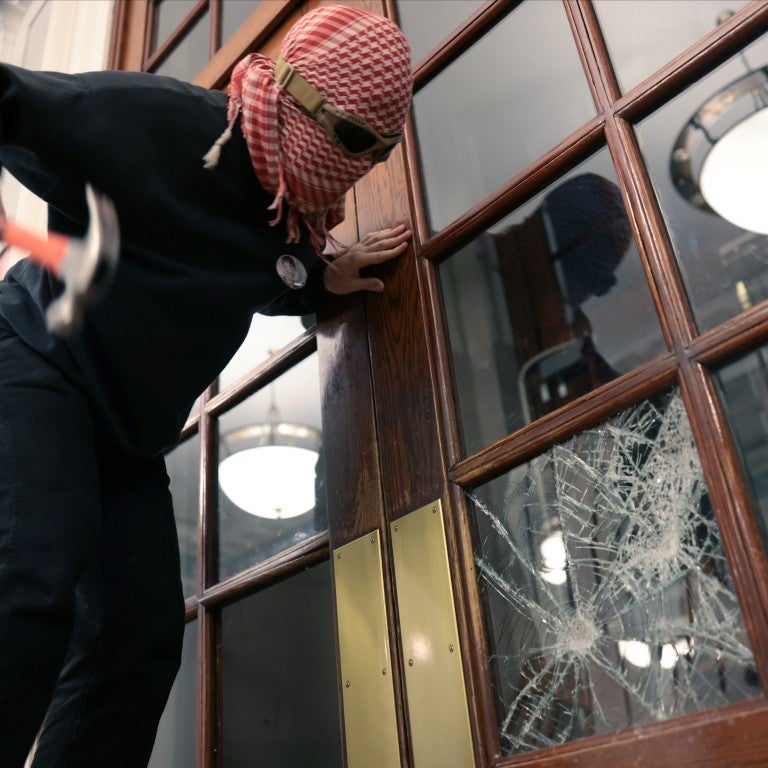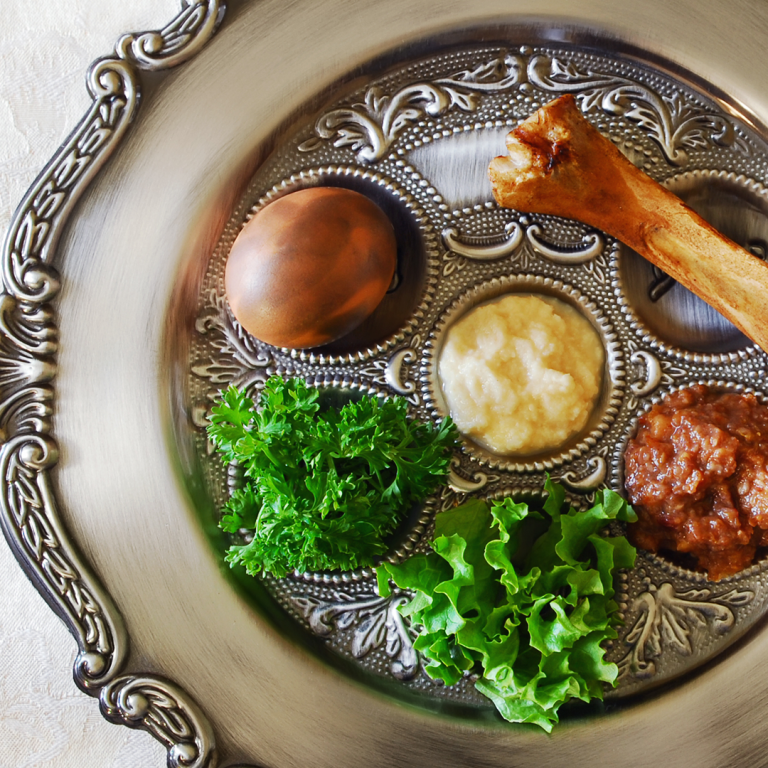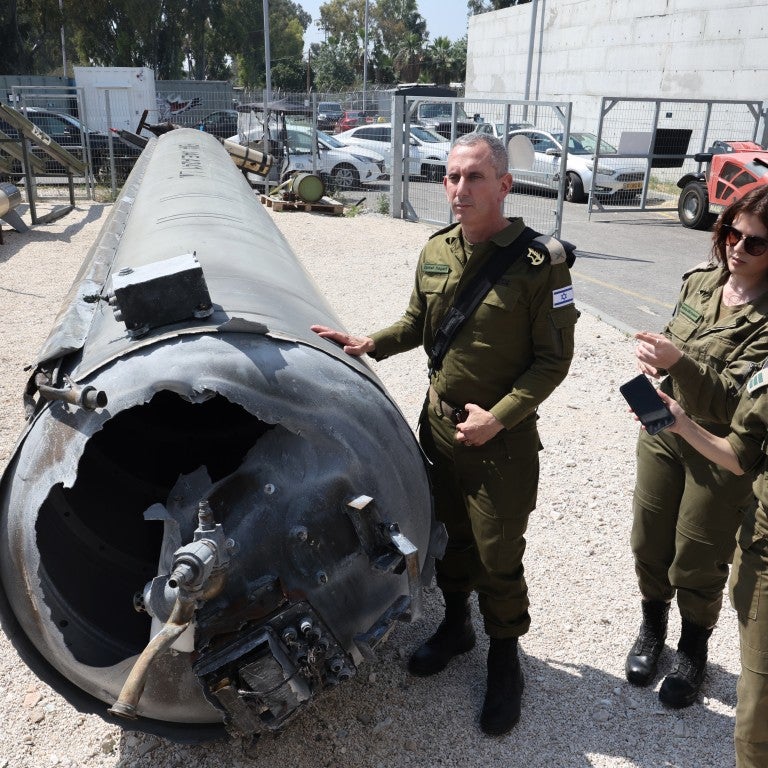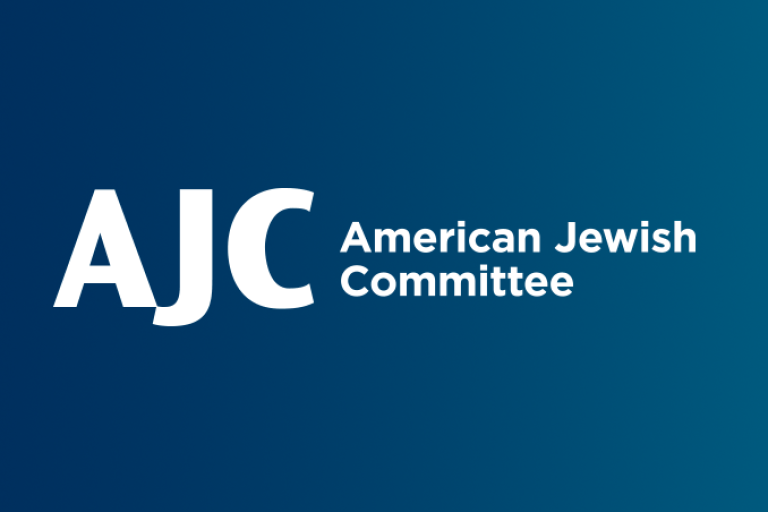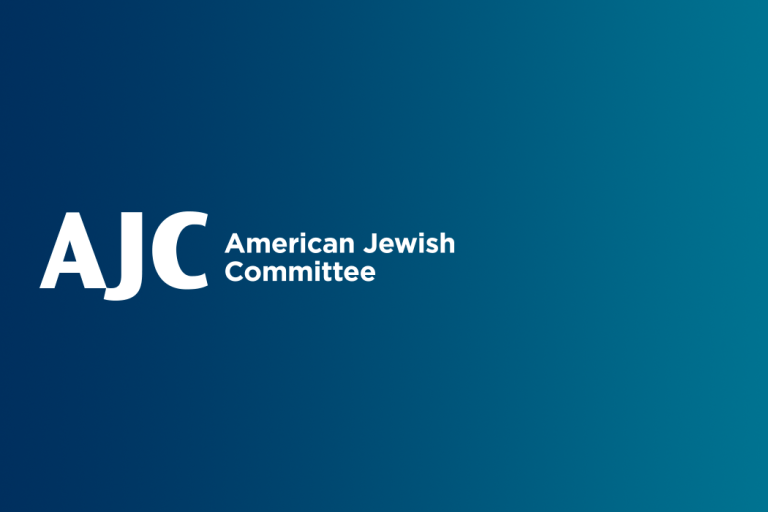February 1, 2024
Dancing. Costumes. Music. Rockets. Running. Chaos.
At 6:29 am on the morning of October 7, Tal Shimony went from dancing in a field outside the Southern Israeli kibbutz of Re’im at the Supernova Music Festival to running for her life as the site was attacked by Hamas terrorists. Tal guides us through the horrors she witnessed that morning, and the exhibit 'Nova 6.29,' where the community aims to tell their story and honor those killed and taken hostage, in the deadliest attack on a music event in history.
*The views and opinions expressed by guests do not necessarily reflect the views or position of AJC.
Episode Lineup:
- (0:40) Tal Shimony
Show Notes:
Song credits: Clear Test Signal Artifex Remix - Nova Tribute
Learn more: Tribe of Nova
Listen – People of the Pod on the Israel-Hamas War:
- How to Mark International Holocaust Remembrance Day in a Post-October 7th World
- A Spider Web of Terror: How Iran’s Axis of Houthis, Hezbollah, and Hamas Threaten Israel and America
- Unpacking South Africa’s Baseless Genocide Charge Against Israel
- Countering the Denial and Distortion of the 10/7 Hamas Attack
Follow People of the Pod on your favorite podcast app, and learn more at AJC.org/PeopleofthePod
You can reach us at: peopleofthepod@ajc.org
If you’ve appreciated this episode, please be sure to tell your friends, and rate and review us on Apple Podcasts.
Transcript of Interview with Tal Shimony:
Manya Brachear Pashman:
More than 3000 people were at the Supernova Music Festival that began on Friday night October 6, and was meant to last through the next day. But at 6:29 am on October 7, it came to an end. In the horrific hours that followed, more than 400 people were killed and more than 40 kidnapped by Hamas terrorists.
Survivors organized an exhibit at the Tel Aviv Expo to tell their story. ‘Nova 6.29’ is named for the moment when rockets began falling on the tribe of Nova desert rave. During an AJC Project Interchange Fact Finding Delegation to Israel in December 2023, my colleagues met survivor and organizer Tal Shimony. After hearing her story, we wanted you to meet her too.
Tal, welcome to People of the Pod.
Tal Shimony:
Thank you so much for inviting me, it means a lot for me and also for my tribe.
Manya Brachear Pashman:
So before we begin, I'm hoping you can kind of help our audience understand your tribe and understand just what the tribe of Nova or trance culture is, and what were people celebrating that morning?
Tal Shimony:
Yeah, of course, I will explain to the audience about trance culture and who we are. It's named after music, electronic music. What's very interesting about this music, it came to Israel around the 80s from the area of India, and very soon became a very popular culture here and a very big scene here in Israel.
Every weekend, we have around 20 parties that are happening in nature, that are celebrating this culture. The trance culture is connected in a way to the more liberal and free culture, connected to the yoga world. Which means it's a very global and international thing. We're speaking about love and peace.
In all of the international trance festivals, it's not very much allowed to bring national flags. You're not allowed to bring flags of your own country. You can bring flags that are stating a peace of love or stuff that are representing your group of friends, but nothing that is representing anything national. The aim is to do a community that has no judgment. That everyone can join it. If you're a good person, and you love nature, and you love humankind, and you love the music, you can join. And that's the Nova tribe’s main values. These are the things that we are standing for.
And the gap between what happened to us at 6:29 that morning, and of course, the whole day after, because it's not just that moment that was horrible. It was the whole day after it and of course, until now it's still going on. And from that moment on, the gap between this and who we are and what we are and what we came to celebrate is so big.
For me, this is the unbelievable thing. A lot of time I ask myself, What am I doing here? What happened? Why did it happen to us?
Manya Brachear Pashman:
How many festivals have you been to personally, and what took you to that one in October?
Tal Shimony:
I've been going to trance festivals and nature parties in Israel since I'm really young. I live in a really small village in the north that is quite hippy. So these things are a part of who I am and what I do since I'm around 15. My first International Festival was in Hungary when I was 19. So I traveled to festivals around the world when I was very young. Today, I'm 25.
So this thing has been a part of my world for a while now. And Nova festival came into my world around two years ago. I went to the same festival as I went to the first time. And I didn't want to go alone. And some of my friends connected me to one of the Nova producers, Nimrod Arnin, or the way I call him, Nimi. He’s a good friend. And became sort of a little love story, not in the romantic way. But in a way they opened their arms to me, this production, said come join us, just be with us as our friends. And I just fell in love with these people. They are so beautiful.
The people who will lead this community are people that are full with heart, all they want to do is give good to this world. They volunteer monthly as a production. And we have another volunteering now and this week on Friday. This is something that they do all the time and, and every time and at some point, I decided that every time I'm going to come to visit Israel, I will visit in the time of the Nova festival.
I've been living in Berlin for the last three and a half years. So it's not like it's been easy for me to come to the Israeli festival of Nova. But I did. I felt like it was important to me to do so. And they really produce something that is in international levels. Just like the Hungarian festival I went to or the Portuguese Boom famous festival or Universo Paralello, which is the festival that Nova worked in collaboration with in the seventh of October.
The international trance community is hugging us as much as they can, because it's also very complex for them. This is for me what this thing is about.
Manya Brachear Pashman:
Can you take us back to October 6, and then October 7, Tal, and tell our listeners what you went through that day personally?
Tal Shimony:
Yeah. So I was not supposed to be at that party. But I got a call from one of the producers, my friend, his name is Dov. And he needed help in a new ecological team. He's been building up this first of a kind ecological project in an Israeli festival, using reusable cups in the bar, and handing out trash bags to the audience and differentiating trash, plastic trash and non-plastic trash, things that are really revolutionary in Israel.
And since I was living in Berlin, in Germany, as you know, is top one in this thing. He called me and he asked for help. I was supposed to come to Israel for the winter because the Berlin winter was too cold for me. And I decided I'm going to take my flight a bit more earlier than I planned and landed in Israel in the second of October.
Which means the sixth of October was my first Friday at home after many months. I was doing a Friday dinner, shishi, Shabbat dinner with my family. Around 11 I took a ride with a friend. And we had two other friends in the car and we drove into the party. I arrived around 12:30.
And I said it to you before the podcast that my boyfriend is one of the leaders of this production. He was already there. He was setting up the event, so this is why I had to take a ride. And he had his car there.
And then he was really tired, he went to sleep. And I started working. At around 4am, I got a radio. And I started doing my job. And around 5:45, actually, quite exactly, my friend Yarin, he was going to play. His DJ name is Artifex, you probably know this name. He is the last DJ who played at the party.
I woke up my boyfriend at 5:45, and I told him, let's go to dance, I can take my break now. And we can go and hear Yarin play on the main dance floor. It's a really big dance floor. It's one of the biggest he ever played in, so we were very excited for him. He’s a good friend. And we went to dance.
Now you see in the dance floors of, especially of Nova community, but generally in the trance community, you don't really need to stay next to your friends, you can walk around, everyone are friends with everyone, everyone is super friendly and nice. And I think it's a very beautiful atmosphere. As I said, no judgment, everyone was smiling at you.
Manya Brachear Pashman:
And then the sun starts to rise over the festival, right? Describe that for us.
Tal Shimony:
I don't think there are words that can express how you can feel when the sun is rising on a desert party in Israel. First of all, the Israeli sunrises in the desert are the most beautiful thing you can see. Really. I've seen a lot of sunrises, in a lot of places in the world, I'm traveling quite a lot. This is something else. The atmosphere is magical.
And also, you are dancing in the dark next to people that you don't see, when suddenly the light of the sun comes in, and you can see the people around you. You can see their eyes, you can see their faces.
And I think around 6:20 the sun was already starting to rise and at 6:20 my boyfriend said he's going to the bathroom and I asked to join him. He found me in the dance floor somehow, which was luck for both of us. And we went to the bathroom, we went outside the bathroom at 6:29. And I can see a missile from far away. And I asked my boyfriend, didn't you say there is a ceasefire?
And the minute I finished my sentence, hundreds of rockets are already flying above my head. And when I say above my head, you need to understand it was very, very close to my head. Physically, you can really feel the echo on your body, the echo of the Iron Dome, disarming these missiles.
Now we are in an open field and as an Israeli I know that open field missiles are not usually being disarmed by Iron Dome because it's protecting the villages. So we are deciding to go away from the area of the party. So if there will be any missiles exploding on the ground and heating something with electricity, so we will be safe. Like us a lot of people are doing so there is a lot of mess in the beginning.
Very fast the music is turned off. Very fast our head of security, Aviv Avraham, rest in peace, who was murdered at the event after saving lots of people's life. He's calling on the speakers that there is a red alert, which means missiles, that the party's over and everyone should go outside of the party area to their cars, take their cars and go away. Now we are production members. We also meet some of the production members outside the area of the party. And we don't really know what to do. Should we go, should we help the security members take everyone outside, what should we do?
We go back to the area where my boyfriend's car was, next to the police improvised tent that was there. We have 27 police officers on the job, 80 security members, private security that the Nova is hiring. And one of the police officers was screaming from the tent: everyone who has a car take your car, go away, the party's over.
Manya Brachear Pashman:
Did you still feel compelled to stay or did you follow his orders and flee?
Tal Shimony:
In the moment that these missiles are flying above my head at 6:29, I immediately get an anxiety attack. So everything I'm telling you right now are stuff that my boyfriend told me. And he was leading me through. So he was leading me out of the area of the party, and then into the car physically taking me because I was incapable of walking, my body completely froze. I couldn't speak. I couldn't say anything but the name of my dog for a while, because she was home. And this is the only thing I could think about. And also saying to him, What can we do? Can we help? He said, I also said that, which is quite funny, because who I can help to when I'm like this. The mind can be very tricky at that point.
We take the car, we go inside the car, and we're driving through the emergency exit. From the left side of us, we can already see the traffic of cars coming out of the event, it's 4,000 people, around 2,000 cars. One road. There is no other way.
We take the left turn towards the north, and we drive away. At that point, we decided we're going to take a safe house.
We didn't know there were terrorists. We knew they were only missiles. So we decided we're going to go to the artist's house the production has rented. And we're going to go to the protected room there because this is the safest place we know. And the closest place we know.
My boyfriend was also thinking about stopping on the road, in the protected houses that are on the road, protected rooms. These places became death traps that many of my friends were there and murdered. And some of our friends were there and were lucky enough to survive and tell horrible stories from there. And I am very lucky he thought that way. And then for some reason he didn't do so. Everything is very random.
We arrive into this house. He's opening his phone and you can see a message in the group that says that there are terrorists in the party. I'm calling my best friend, Or. She was working in the entrance. I can hear gunshots when Or is talking to me. She's talking with me for a while, around 20 minutes, where she's been led by police officers in the field, trying to escape terrorists that have arrived. And the conversation ends with, Tal I have to ditch my car, I’ll call you later, bye. And she hangs up.
Manya Brachear Pashman:
I hope you will tell us what happened to her later. But what is going through your mind at this point? It seems so cliche to ask, but what do you remember feeling in such a moment of confusion and utter chaos?
Tal Shimony:
Helplessness I think is the best way to describe the way I feel right now. I want to go out, take my take my boyfriend’s car and go and save everyone I can, because this phone call is just one out of many we got at the same time. We get notified of people we know being murdered. Some of our friends saw it happening, and they are texting us. And then we realize everyone ditched their cars.
At that point a couple, a friend of ours in, one girl that he managed to take with him. They're coming into this safe house and they are telling us that they saw someone completely wounded from gunshots on the way they wanted to take him and help him and he told them leave me here. I'm out. Don't take me, you will die. And they had to continue driving because they were shooting at that time.
And the stories that continue to come and at some point we’re being asked by our production to start gathering locations of our friends that are hiding and running away from terrorists. We are posting everywhere online that we need people to send us the locations and that we need people to help us get to our people.
At that point one of our security members with some military man's that were in voluntarily arriving into the era. He managed to sort of take back the area of the party from the terrorists, because they conquered it. Even when I say it, like four months ahead, it still sounds to me like a movie.
At 8:30 I get a video call from the same friend, Or, this time, she's running in an open field and I can see the terrorists running behind her. And I scream at her to run as fast as she can. And I scream at her that I love her. She doesn't really talk. She says to me, she loves me back. And she hangs up. She was saying goodbye.
Now you see, I was a shooting instructor in the army. And I see my friend in an open field when terrorists are shooting at her. For me, she's dead. There is no other option. And she's a friend of mine, and also everyone else who was sitting there with me. And we all hear her in this conversation and we are completely broken at that moment.
Half an hour later, I get a sign of life from her when she says to me, Sister, I got shot. She got shot in her leg. She survived. But after she got shot in her leg, she had to run 10 more kilometers with a gunshot in her leg. She survived, but I think her soul died that day and she had to rebirth.
Manya Brachear Pashman:
I am so relieved to hear that Or survived. When were you finally able to leave the house that you were trapped in and go home?
Tal Shimony:
This house is not far away from the area of the party and definitely not far away from Gaza. It's next to a city called Netivot. Netivot is a small city in the area of Sderot and Ofakim, and the terrorists are arriving there at some point. They're not arriving into the village we are. And there is a civilian squad who is protecting us. But they are getting very much closer to us all the time. We have television so we can see it on the news that they are getting closer.
And this entire day, I'm trying to send locations of people that I know and people I don't know and I get phone calls from worried mothers asking me to see what's going on with their child. And this whole thing is happening while in one hand, I have my phone, and I'm calling people in the other hand, they have a knife. Because they are coming closer. And I need to protect myself.
And this feeling of fear and helplessness being all the time switching, and anxiety attacks that are being escort me until this day, and on the seventh of October, I think I had around 48 hours of an extended anxiety attack that was going on and off.
At 5pm, my boyfriend decided he had enough and he doesn't want to stay in this house in the dark and we want to go home. We are calling the head of the civilian squad that is protecting the little village we are in. We're telling them we want to leave. And he says to me on the phone like this, listen, I can't guarantee you're going to survive this, right, it's your choice. We have no idea where they are right now. This is your decision. I don't take responsibility for that. And we decide to leave anyway. I don't remember anything from that ride, only two burned cars. And that's it.
Manya Brachear Pashman:
Thank God you survived that trip. Tal, how have you coped during the weeks and months since then?
Tal Shimony:
I think in the first week, I didn't sleep at all. Everything is very vague. The day after the seventh of October, the eighth of October was the hardest day for me because I realized how many people I know lost their life that day.
And then started a week that was the most horrible week in my life. So every day I go to around three funerals of people that I know from the international festivals, from home, from other circles in my life, and some of the funerals of my friends I couldn't arrive because they were in the parallel time for another funeral. And the decision was to choose which one of my friends I'm saying goodbye to.
Some of them were also in areas of risk, like the desert, like the Israeli South. And some of them were in the North that was very much involved at that point. Nimrod Arnin, my friend who welcomed me into this community, his sister, 19 years old, Ayelet Arnin, was murdered. So we went to, of course, to her funeral, and there was an alarm. And it's 30 Nova survivors in a house that doesn't really have a place for us to be protected. So we couldn't stay for this funeral. We all left. It was very sad.
And that's how my first week goes. I still carry with me marks of this. Anxiety attacks that are happening. My sleepless nights, nightmares that are worse than anyone can imagine. Yeah. This is my life right now.
Manya Brachear Pashman:
This is so unfathomable, and Tal, and I am so grateful to you for sharing all of that, because I think it is hard for so many people to truly fathom the horrors of that day.
And I imagine that is part of why this exhibit came together. Can you tell us how it came together, who's behind it, and kind of describe it to our listeners?
Tal Shimony:
So all the villages next to Gaza–Kibbutz Nir Oz, Kibbutz Re’im–all these beautiful places that were burned out by Hamas, they have something to show, they can show people this is what happened to us.
The Nova parties, just like any other international festival, are being built and disassembled in a matter of hours or days. And we had nothing to show. Our community is the biggest community hit by this day. A third of all the victims from the seventh of October are coming from the Nova community, it's such a big number.
After the seventh of October, the first thing that we did as a community was building a healing center for the community where we had body treatment, mental treatment, workshops, everything we thought about that can help people. Of course, at some point, the artists of Israel came to play music for us. And during that time, some producers in Israel came to help us because some of them are the dinosaurs of the tribe of trance in Israel, it's a big thing. And they wanted to help.
And one of them came up with this idea of rebuilding the area of the party, as an exhibition for the public. And this exhibition, what you can see there, is the original party place. So it's the shadow tent, the big one that everyone can see in all the videos, is being rebuilt there. The bars, the camping area, the stages.
We also have there toilets. The ones that I left from, and these toilets are now full with bullet holes, real bullet holes, from the terrorist attack. For example, we know that around 30 people were hiding in these toilets and only three came out. And you can see and bear witness with your eyes on these things. You can see how many bullets are in every cell, they really didn't let anyone survive.
You can see burned cars, because Hamas just burned everything they saw with every measure they had. So if it's special explosives that burns everything very fast and at a very high temperature, if it’s RPGs, if it’s fuel, they used everything they had.
Some people were hiding underneath the car, inside the trunk, and they were burned alive. And you can see that there. I have so many stories of friends that we found their bodies in cars. And it took so long to identify the bodies because when you burn the human body, there is nothing left.
Manya Brachear Pashman:
After living through what you did, what was it like to see the scene recreated and memorialized for the exhibit?
Tal Shimony:
For me, the first time I arrived into this exhibition was horrible. The most horrible part was not all these things. The most horrible part was the screens. We had screens of pictures of the kidnapped people, and a screen of murdered people, all the faces, pictures of them. And between these two, we had a little place of lost and found.
Everything that was found in the area of the party was brought there. Some people find their stuff there. It's a very exciting moment. But there is one table that was always staying the same. I call it the fun table.
So when you are going to trance party or into a Nova party, you usually bring with you stuff that makes other people happy. Because this is the tribe, this is what we do.
So for example, I like to put on a costume of a fairy. So I have my wings, and I have my elf ears and I have many glitters. And some people are going around with really nice, beautiful, colorful umbrellas. Some people are going with a Hollywood sign of action and running around the dance floor and saying action to people.
Some people are going with water guns and shooting at people in the dance floor. It’s very warm in the Israeli desert. And people brought all these things with them. Some people bring some juggling, very expensive juggling stuff to entertain themselves and the audience. And this table was always remaining full.
And at some point I realized why. I was thinking to myself, if I would lose my own juggling equipment which I bring to every party, if I would lose it in the area of the party, I would come back to take it. There is no way. It's so expensive and it's so sentimental and it's so personal. And I know that my mother would never know how it looks like.
So I believe that most of the things in this table were belonging to victims because they were just staying there for so long, and they look so insignificant for someone from the outside.
For me, that was the most hard table, hard area in the party, because you can see the pictures of the victims and you can see equipment that you understand that the only person who can take them is this people that belongs these things, because they are so personal.
Manya Brachear Pashman:
You make a really good point about the exhibit memorializing a culture that's so ephemeral, so intangible. And I'm curious if there is a therapeutic quality to the trance culture? And is there a therapeutic quality to this exhibit, both for those who have organized it, and for those who are visiting?
Tal Shimony:
I always end my tours there, when I was doing tours, I was always ending them with this table that I told you about in the last one and I always told them that I still see the hope. Because I know I have my festival clothes at home and also all my friends and we all have our fun stuff, waiting for us to come back dancing. Because for me, dancing means healing. Dancing means therapy. Dancing means being connected to myself.
And the great Raja Ram, which is a very big DJ, famous trance DJ. When he was asked about dancing in a trance festival what it means, he was saying something very beautiful. He was saying you forget who you are. You forget your identity. You forget your job. You are just there at that moment. And that moment is so beautiful.
And I think we all need to come back dancing. We have every Wednesdays now a Healing Center, a community day that has being end with two hours of trance music. And there are therapists around if someone needs help, and some people are not staying. They know that at 8pm starts a set, a set of trance, so they are not staying because it's too much for them. They're coming there for the therapy and they're coming there to meet their friends and be together and hug. And some are staying and fighting through it.
And it's a beautiful thing to see. It's a beautiful thing to see but it takes time. I have to say that. We are trying to be back dancing but I have to say I tried a few times to go to nature parties, and it ended up with very big anxiety attacks. And I'm, let's say a very high-functioning survivor, I can help others, which is not something I take for granted.
So yes, definitely, we will dance again. And we don't say this sentence…again together as a community. Because it's a part of our healing.
I believe my friends, who are not with us, are very proud of the Nova tribe, for continuing dancing, for trying to heal and come back to the dance floors. This is what they left for us. They said to us with everything, with everything they have, dance. With everything they have. They will not die in another way. They died in the middle of one of the most beautiful things you can do.
Unfortunately, a very horrible death. But if I want to remember these people, as they were, I would like to remember them dancing on the dance floor with me. And they will dance with me when I dance everywhere.
Manya Brachear Pashman:
Tal, the Grammy Awards are this Sunday, February 4th. Of course, it's not just an awards show. It's a platform for artists to speak out or pay tribute, and we’ve seen that after horrific events like the shooting at the Route 91 country music festival in Las Vegas or the bombing at an Ariana Grande concert in England.
Do you feel that the music world has spoken out about Nova?
Tal Shimony:
Definitely not. I would expect the music industry to talk about it at the international level. You can say, we are not talking about politics, we don't talk about Israel, we just talk about Nova. I think it's something that is possible to do. But it takes some bravery.
Because people are connecting what happened with Nova to what happened generally on the seventh of October, and for me going inside the music trance festival is like going into international grounds. Really, it's just like the same for me. And the thing that the music industry is forgetting is that, as you said yourself, there were so many music events that were attacked by terror before.
And that can happen in every trance music festival around the world. They forget it, that each and every country, also in the US, there is many, many festivals with this type of music and this type of culture. They forget it, it could have happened everywhere else, everywhere else.
And of course, I would have expected the Grammys to do something about it, but I don't. I know how it works. When it comes to Israel, it's always been separated. It's just like all the women organizations that are always talking about rape publicly.
When it came to the seventh October attack, which women were raped, by the way a lot of them were raped in the rave, in the Nova party. We have testimonies of our friends. Yesterday, even some of the representatives of the UN came to our Community Day to speak with some of the witnesses, because they came here to Israel to do it.
I can’t understand why they need to come to believe me. There is a movement now that's called Me Too Unless You're a Jew. And when I saw even the name of it I was like, how can they separate me from the rest of the world, if I was in an international festival, music festival, just like anywhere else in the world?
Manya Brachear Pashman:
What would be a meaningful tribute in your eyes? What would you like to see at the Grammys on Sunday?
Tal Shimony:
I think they should do something similar to whatever they did on other occasions that terror attacks were happening, for any music festival or any music performance or in any other thing. I think they are creative enough and they are very good producers, they are bigger than, than whatever the Nova will ever be. So I trust them to know that they should recognize the fact that there was an attack in a music industry related festival.
But I'm also not expecting them to do so because I know that this festival was in Israel. And everything that is connected to Israel or to Jews is being treated differently. People are saying it's not antisemitism, but I'm asking myself, so what is it?
Manya Brachear Pashman:
Will this exhibit travel, Tal? Will there be an opportunity for people around the world to see this and to memorialize this community?
Tal Shimony:
Yes, we are working on it, very hard, actually. I'm a part of the international team right now. It seems like the first destination might be New York or LA, but the United States.
I think it's very important that everyone who can will come to this exhibition when it will arrive to an area that is close to them because it will mean a lot to the Nova community and also to the Israeli state.
Manya Brachear Pashman:
Tal, thank you so much for joining us.
Tal Shimony:
Thank you so much for inviting me. It means a lot and I'm so grateful for being here today.
Manya Brachear Pashman:
If you missed last week’s episode, be sure to tune in for my conversation with Mark Weitzman from the World Jewish Restitution Organization, on how Holocaust museums worldwide and in Israel are grappling with the aftermath of October 7 in their exhibits. And tune in next week, for another conversation with a Supernova survivor, Yoni Diller. He shares his journey from that field in southern Israel that morning to American college campuses.
Manya Brachear Pashman:
The music heard throughout this episode was the last track played at Nova on October 7, when Hamas terrorists stormed the festival. The remix by DJ Artifex was released in dedication to all lives lost and forever changed that morning.
